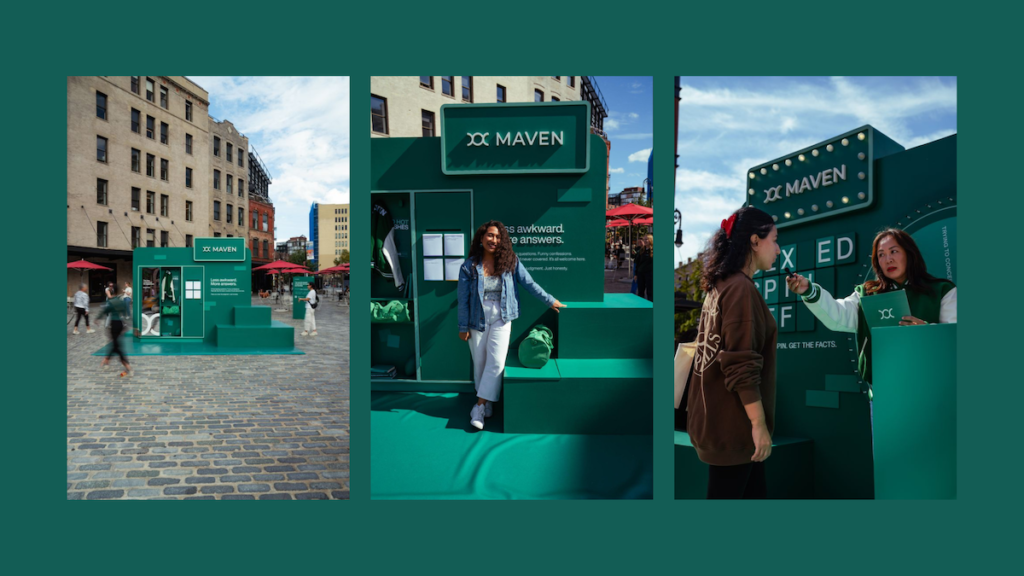
Propped up in the middle of the Meatpacking District on Tuesday afternoon, a grass-green Wheel-of-Fortune-style spinner drew a patient queue of New Yorkers to Gansevoort Plaza.
The headline over the booth read “SEX ED, SPIN-OFF.” Wedges on the wheel—“menstrual health,” “fertility,” “anatomy,” “sexual health” clicked past as comedian and event host, Alyce Chan teased the crowd, handed out prizes, and read myth-busting prompts off laminated cue cards.
It felt less like health class and more like a street fair by design. The pop-up was part of Maven Clinic’s one-day “Sex Ed, Rewind,” an attempt to take sex education out of the classroom and into real life.
“Too often, what people learn in sex ed stops short of preparing them for adulthood,” Maven founder and CEO Kate Ryder told me while in attendance at the pop-up. “One of the most common refrains we hear after a virtual appointment on Maven across fertility, pregnancy, and menopause is also the most hard-hitting: ‘Why didn’t anybody tell me this sooner?’ Maven exists to change that, giving women and families trusted, comprehensive care and guidance through every stage of life.”
The pop-up, she added, is one expression of a bigger campaign that will live on social, in community activations and, eventually, in AI-powered tools so accurate information finds people where they already spend time.
If you’re wondering why a healthcare company is hosting a sidewalk game show, start with the numbers. Gen Z now treats the internet and increasingly social platforms as a primary health teacher. In a 2025 McKinsey survey, 38% of Gen Z said they use social media for health and wellness information, making it the generation’s No. 2 source after general internet search; only 42% said they turn to doctors first. Another 2024 survey (1,000 U.S. Gen Z respondents) found that roughly one in three said TikTok is their main source for health information.
Ryder is blunt about the stakes: “We’re living in a world where so much of what shows up in your feed isn’t necessarily accurate. You need to know which brands you can trust. Maven is one of them.”
As she sees it, the company’s role is part care delivery, part translation layer. “Across all of our programs, members say their favorite thing is connecting with providers who understand them and who can answer questions in the privacy of their homes.”

Inside the activation, the gap between what people were taught and what they need to know came up again and again. “I’m a fertility awareness educator,” said Darcy Black, who spends her days helping Maven members read their cycles and plan for pregnancy. “There’s a big whiplash when you go from avoiding conception to trying to conceive. The humbling, rude awakening is realizing you can’t get pregnant on any day. It’s a very specific window. An algorithm won’t always catch that.”
She loves tech, she said, but sees clients “tracking urinary hormones, tracking temperature with so much data and still not knowing what to do with it. What’s missing is body literacy and learning the language of your own body.”
Senior medical director Dr. Danielle Dang called today’s social health landscape “a double-edged sword.” “The awareness is great. People are finally talking about sex, IVF, even discharge, which were stigmatized,” she said. “But misinformation travels faster than corrections. I spend a lot of time unwinding viral hacks like the Mucinex thing so people don’t lose precious time on their goals. The shortcut culture of social media can turn a small study into a ‘revolution,’ and that’s not how evidence works.”
If school had covered more than “how not to get pregnant,” Dang argued, adults wouldn’t be left to piece together the basics during the exact life stages when time matters.
Multiple studies suggest schools rarely require explicit menstrual or menopause education. Research reviews note that U.S. standards often omit menstrual health entirely or address it inconsistently; some analyses find only a handful of states clearly spell out menstrual topics. Meanwhile, surveys in the U.S. and U.K. indicate that roughly eight in ten women report they were never taught about menopause in school.
On the sidewalk, the human version of those statistics showed up between spins of the wheel. “I wish we’d learned what comes after sex,” said Monique, 28, who had diverted from a Brooklyn commute when she saw the setup on her social media For You Page. “In class it was body parts and STIs. No one talked about the emotional side, or what it means for a relationship, or that a baby might happen and you need support.” She laughed when I asked where she goes with questions. “Google first. I’m old Gen Z. AI is new for me, but I’m trying.”
Black added, “Painful periods normalized for years, ‘that’s just how it is,’ and nobody told you it could signal a disease like endometriosis. That’s not just a personal burden but it ripples into school, work, policy and everything else.”
Dang added that inclusive language and inclusive care are part of the fix. “Not everyone who bleeds is a woman. Not everyone who uses IVF is a straight couple with infertility. Good sex ed starts by meeting people where they are.”
Ryder’s definition of success for the campaign is pragmatic. The goal is reach. “The more people who know about Maven, the more who connect with providers who are trained menopause-trained OBs, fertility experts, midwives, mental-health clinicians, the better,” she said.
The company handed out a limited number of free appointment codes at the pop-up; the broader campaign mixes IRL moments like Tuesday’s with digital content to keep the “rewind” going after the booth packs up.
There’s a subtle thesis to “Sex Ed, Rewind”: if social feeds are already where health questions start, then credible actors need to show up there with something better than hot takes. The Gansevoort Plaza experiment felt like an early sketch of that future: hyper-shareable, a little goofy, but tethered to clinicians who can do the slower, quieter work of one-on-one care.
By late afternoon, the foghorn rhythm of the wheel had become part of the plaza’s soundtrack. A teenager won a sleep-tracker; a dad pocketed a pamphlet on pelvic floor basics; a pair of twenty-somethings debated whether “period brain” is a thing. (It’s complicated.) On another day, in another feed, those debates will get flattened into a single confident answer. On this corner, at least for a few hours, the internet took a back seat to something more analog: questions asked out loud, answered by humans, and if Maven has its way–followed up later from the privacy of home.



